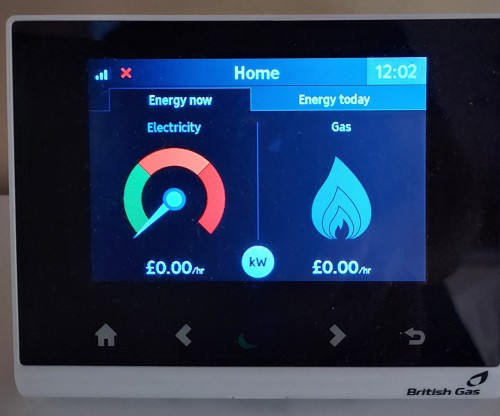
Sustainability
|
organic●ally™ was started to promote the use of pesticide-free products that can be reused repeatedly. This, we believe, represents an important aspect of sustainability. We began this quest long before many became aware of the consequences of "climate change".
As a matter of principle I avoided sewing except when I am able to do so in natural light. This gets difficult during the winter months when daylight is in short supply.
We took the first opportunity to install solar panels to power the house. and as I have indicated elsewhere, when the sun shines, our smart meter could look like this: |
When the sun is not shining, we use reserves in the batteries. To that extent, the products we sell are even more sustainable than before. With the increase in utility prices, solar energy (when the sun shines!), is also helping to reduce costs, thus making it possible to hold down prices for as long as we are able.
Sustainability also matters in other processes and choice of materials.
Why organic cotton?
- Non-organic cotton occupies only 3% of the world’s farmland, but uses 25% of the world’s chemical pesticides which ends up not only in the cotton, but in the air, water and soil.
- The most acutely toxic pesticide registered by the Environment Protection Agency is aldicarb. In California alone between 1970 and 1994, 85 to 95% of total aldicarb was used on cotton.
- Organic cotton farmers eliminate the use of toxic chemicals in every step of the growing process by emphasizing natural and biological methods which do not harm the environment.
- "A young boy of eight had been helping his parents by weeding in the cotton fields. Feeling thirsty, he ran back to the house, but found an empty container by the path and used it to scoop up some water from a ditch. He did not return home, and a village search found his body next to the empty endosulfan bottle innocently used to quench his thirst."
Read how organic cotton (and other) farming is actually helping farmers:
Why not plastics?
- Introduced just over 30 years ago, plastic bag consumption rate is now estimated at well over 500,000,000,000 (that’s 500 billion) plastic bags annually, or almost 1 million per minute.
- Eight billion plastic bags are handed out in the UK each year – or over 134 for every one of us. (Some sources quote the total number given out as 13 billion, 17 billion and 17.5 billion. The numbers are, uhm, plastic.)
- Once brought into existence single-use bags accumulate and persist on our planet for up to 1,000 years - but nobody really knows for sure.
- Only 1 in 200 plastic bags in the UK are recycled.
- Dioxins are produced when plastics are incinerated.
- Plastic bags cause over 100,000 sea turtle and other marine animal deaths every year when animals mistake them for food.
- The average person uses each plastic bag for only 12 minutes.
- Each high quality reusable bag you use has the potential to eliminate an average of 1,000 plastic bags over its lifetime.
Why not AZO dyes?
The organic cotton string bags, hankies and gift bags sold on this site are either un-dyed (in natural grown cotton colours) or dyed only with non-AZO dyes. When placed alongside non-organic fabrics and wrapping paper, these items might appear dull, but there are good reasons for this.
Azo dyes could be banned from skin contact
Azo Dye Regulations in the European Union: An Overview
While our own exposure to AZO dyes on our clothes and accessories might not have long-term harmful effects (but who knows?), workers who are forced to use these dyes in factories are not always so well protected. We hope that our rejection of AZO-dyes will contribute towards worker welfare in the long run.

